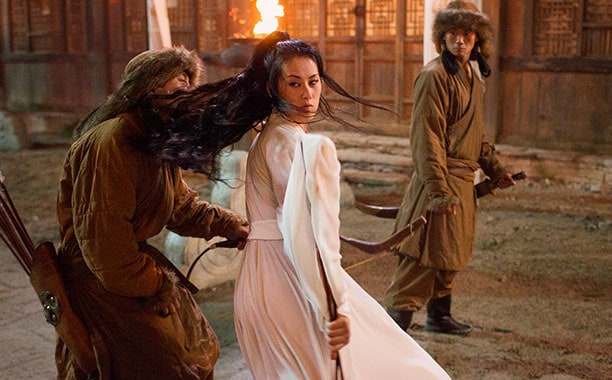
I had some hope for “White Moon” to turn Marco Polo into a Byamba/Marco buddy cop show – and although that dream was mostly filled, it led to another stuffy, hollow hour of television. Like the worst cop shows on television, the first fifty minutes of “White Moon” is a lot of people talking around the truth, establishing any number of suspects who could’ve worked with the Hashshashins. But the episode takes this story line nowhere, shifting its focus throughout from The Not-So-Blue Princess, to the dead-end investigation, to whiny Jingim, and then into some tragic mother/daughter love story that makes no sense – in all, another haphazard, ineffective episode of this fancy-looking, weightless drama.
The dialogue is really what buries this hour; with everyone speaking with such vague terms all the time, there’s no opportunity to boil any ideas down into something interesting. Even the reveal that Kokochin is not really Kokochin isn’t all that interesting; we barely meet the real Kokochin before she’s dead, and the episode never really digs into the most intriguing idea of all – a peasant becoming princess, a story that would’ve neatly mirrored the plight of Mei Lin from royalty to concubine to failed assassin in the first half of the series.
Instead, “White Moon” spends its time with Marco and Byamba questioning Yusuf, and getting nothing but some strange looks off-camera that might mean Yusuf’s a mole, or he’s just a weird red herring. Does it matter? With another attempt on the Khan’s life in this episode (Jia’s desperate move to save his butt on the council, perhaps), Marco Polo‘s already pushing forward ahead into new story, dragging whatever came before it by the slightest of tethers. It makes “White Moon” feel like an hour-long info dump slammed together by some big fancy event that was never mentioned before this episode, a series of conveniences that can’t capitalize on the simple stories it orchestrated for itself to play out.
The mole hunt ties itself into the Blue Princess story when Marco slurs through some threatening words to Not-Kokochin, proving that while he’s a wimp around most people, he has no problem talking down to women – but pushing these two stories together makes no sense. Again, there is no real development in this episode at any point to establish motive for anyone on/around the Council to kill the khan; with no talk of culture, religion, or the expansion of the empire, there’s no motivation for any of these ancillary characters (at least in the eyes of the audience) to try and take out the Khan – which means its reveal will be delivered mainly for shock purposes, rendering the entire story useless in the long run. None of these characters matter because they’re one-dimensional; and rather than develop them all through the central mystery of Whodunnit?, Marco Polo continues to dance around the edges of anything meaningful.
Kokochin’s a fake, Yusuf’s a Muslim (gasp!), Niccolo’s a crappy father, Marco is God’s gift to everyone; in the end, “White Moon” is sold short by its lack of character development. Mei Lin, who has been silently standing around naked for four episodes, is suddenly spurned into desperate action when she finds out Jia’s been breaking her daughter’s feet for some weird tradition/sado-masochistic lesson about the nature of the world. Forget the plausibility of her killing another concubine with that lipstick poison and not killing herself; why would Mei Lin just throw her life away with such a rash decision? It’s not like anyone suspected her of trying to poison the Khan (at least, not yet); however, when Mei sees a female child in the crowd, her passion for being a mother takes over – which obviously ends up with her injured and screaming while surrounded by soldiers, because duh, you’re not killing the khan in a public ceremony (especially in such a small space with only direction to attack from, something an experienced warrior like her should know… but I digress).
See, Marco Polo wants to talk fancy and dramatic – but its long, empty soliloquies about what the Khan may or may not want, and what someone else may or may not do lacks drama. By definition, drama requires something to be taken to an extreme (hence, creating drama): however, there must be something underneath that dramatic concept to support it, primarily character, which then fuels motivation and builds out a world. The only motivation characters on Marco Polo have are the ones shouted directly in their faces by other characters; not only do characters lack clear, direct motivation, but they only act when told to, because the writers clearly don’t trust the audience enough to understand any subtlety (again, Mei Lin deciding to go kamikaze when she sees someone’s child).
There is some plot advancement in “White Moon”, but it’s inconsequential to this point; Jia’s been pushed out of power on the Song council, which leads to a lot of talk about how people don’t understand him. Well, Jia’s going to Jia, so I’m fully expecting all these people pledging their loyalty to him to stage a coup in the next few weeks, or at least to some public demonstration of Jia murdering someone in slick, praying mantis fashion, so we can be reminded of how he’s not to be messed with. I would love an extended power struggle between him and Xie – but let’s be serious, who is going to win here? Just look at which characters have had more screen time; it’s clear whose story Marco Polo is telling in Xiangyang, and it’s not Xie Daoqing’s.
Despite the awesome closing moment (Chabi putting an arrow through Mei Lin’s shoulder), “White Moon” is another frustrating collection of scenes (man, Jingim will not stop whining! Ever!) that only further reveals the deep flaws at the center of its show, from its weak, stilted dialogue to the rote characterizations of important characters. More so, it doesn’t feel like Marco Polo is having any fun when there aren’t swords or naked women on-screen; and for a show that clearly wants to be considered an Important Prestigious Drama, that’s an extremely troubling trait.
Photo via Netflix
 Follow Us
Follow Us





